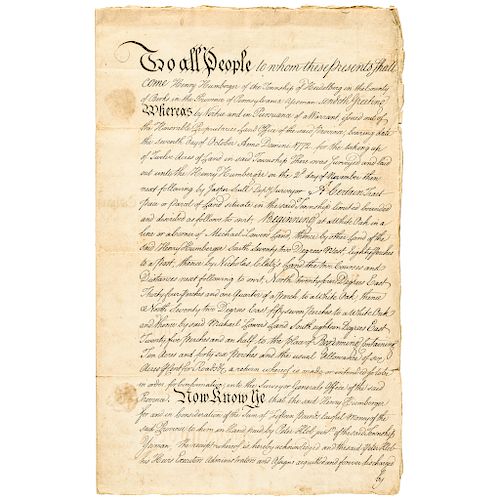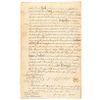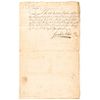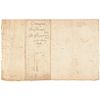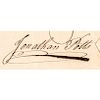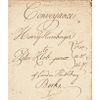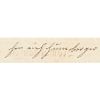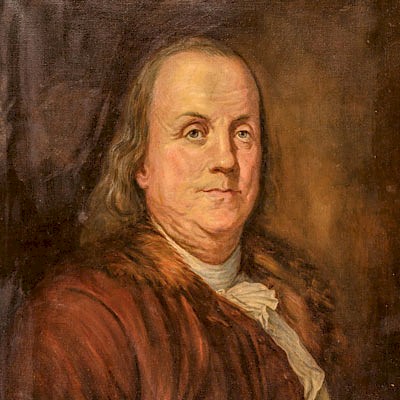1775 JONATHAN POTTS Historic Revolutionary War Patriot-Physician Signed Document
Lot 73
Estimate:
$800 - $1,000
Absentee vs Live bid
Two ways to bid:
- Leave a max absentee bid and the platform will bid on your behalf up to your maximum bid during the live auction.
- Bid live during the auction and your bids will be submitted real-time to the auctioneer.
Bid Increments
| Price | Bid Increment |
|---|---|
| $0 | $10 |
| $200 | $20 |
| $300 | $25 |
| $500 | $50 |
| $1,000 | $100 |
| $2,000 | $200 |
| $3,000 | $250 |
| $5,000 | $500 |
| $10,000 | $1,000 |
| $20,000 | $2,000 |
| $30,000 | $2,500 |
| $50,000 | $5,000 |
| $100,000 | $10,000 |
| $200,000 | $20,000 |
| $300,000 | $25,000 |
| $500,000 | $50,000 |
About Auction
By Early American History Auctions
Aug 24, 2019
Set Reminder
2019-08-24 12:00:00
2019-08-24 12:00:00
America/New_York
Bidsquare
Bidsquare : Autographs, Colonial Currency, Political Americana, Historic Guns
https://www.bidsquare.com/auctions/early-american-history-auctions/autographs-colonial-currency-political-americana-historic-guns-4347
Historic Autographs • Colonial Currency • American Civil War Colonial Era • Revolutionary War • Political Americana • Black History Early American History Auctions auctions@earlyamerican.com
Historic Autographs • Colonial Currency • American Civil War Colonial Era • Revolutionary War • Political Americana • Black History Early American History Auctions auctions@earlyamerican.com
- Lot Description
Autographs
Rare 1775 "Jonathan Potts" Document Signed, Member of the First American Medical Class of Ten who Graduated in 1768 a Patriot-Physician Continental Congress Appointed
JONATHAN POTTS (1745-1781). Member of the First medical class graduated in America, Surgeon and a Medical Director in the Revolutionary War, studied Medicine at the University of Edinburgh with Benjamin Rush, American Revolutionary War Patriot-Physician, Continental Congress Appointed as Deputy Director-General of the General Hospital in the Northern Department.
April 15, 1775-Dated Manuscript Document Signed, "Jonathan Potts" as Justice of the Court of Common Pleas, 8.5" x 13.5", 4 pages, Heidelberg Township, Berks County, Pennsylvania, Choice Very Fine. Being a Land Deed in which Henry Humberger is selling 10 acres of land to Peter Klob for "Fifteen Pounds lawful Money of the said Province". An impressively written Document easily readable in deep rich brown with excellent eye appeal on clean period laid paper, having a magnificent large full signature "Jonathan Potts" measuring about 3" long at its conclusion with his wax and paper seal along side. A rarely encountered and wonderful Document from this historic American Revolutionary War Patriot-Physician.
Doctor Jonathan Potts (1745-1781).
Jonathan Potts, was a Member of the First medical class graduated in America. He was a Surgeon and a Medical Director in the Revolutionary War. Potts was born April 11, 1745, at "Popodickon," the ancestral home of the Potts family named in honor of Popodick, an Indian chief, who was buried near the house, Colebrookdale, Berks County, Pennsylvania.
Jonathan was the son of John Potts, who founded Pottsgrove, now Pottstown, Pennsylvania, whose father, Thomas Potts, came to Pennsylvania the latter part of the 17th century, and was a pioneer in the development of iron interests in that state; his mother was Ruth Savage.
Jonathan received his education at Ephrata and in Philadelphia and determined to study medicine at the University of Edinburgh, so with Benjamin Rush, his friend and relative, sailed from Philadelphia August 31, 1766, and after a perilous voyage of fifty days, reached Liverpool in safety.
His first duty was to communicate with Benjamin Franklin, who gave the young men recommendations to professors of the University of Edinburgh. He was engaged to marry Grace, daughter of Francis Richardson, and when he learned that his "dearest Grace" was ill and longed to see him, he relinquished his studies and returned to America, reaching Philadelphia in April, and was married in May, 1767.
Wishing to continue his medical studies, he entered the Medical School of the College of Philadelphia, the faculty of which was made up of John Morgan, theory and practice of medicine; William Shippen, Jr., anatomy, surgery and midwifery; Adam Kuhn, materia medica and botany; Benjamin Rush, chemistry; Thomas Bond, clinical medicine.
Potts was one of the ten graduates at its first medical commencement, June 21, 1768, to receive the degree of bachelor of medicine. The minutes of the Board of Trustees have the following entry: "An elegant valedictory oration was spoken by Mr. Potts on the advantage derived in the study of physic from a previous liberal education in the other sciences." The subject was selected by Benjamin Franklin.
At a commencement held on June 28, 1771, Potts had the second degree, that of doctor of medicine, conferred upon him, as well as on three other members of the first class-Jonathan Elmer, (q. v.) James Tilton (q. v.) and Nicholas Way. Potts's thesis was entitled, "De Febribus Intermittentibus potentissimum Tertianis" (among the intermittent fevers the most powerful is the Tertian).
He settled to practise at Reading, Pennsylvania. He was a Delegate from Berks County to the provincial meeting of deputies, held in Philadelphia, July 15, 1774, and a Member of the Provincial Congress in 1775.
He was active in raising men and organizing forces in Berks County. On June 6, 1776, he was appointed by Congress physician-surgeon for the Army for Canada and Lake George.
The terrible condition of the hospitals and of the army were markedly improved by the zeal and efficiency displayed by Dr. Potts in executing the orders issued to establish a different state of things. In April, 1777, he was appointed to supersede Dr. Samuel Stringer as deputy director-general of the General Hospital in the Northern department.
For the unremitting attention and services of Dr. Potts and of his medical colleagues during the severe campaign, public recognition was made by Congress in a commendatory resolution passed November 6, 1777. Afterwards Congress appointed him Director-General of the hospitals in the middle department.
It is not known what literary matter he may have written other than an article on smallpox printed about 1771 in Henry Miller's Philadelphia German paper, called the Pennsylvania Staatsbote.
He died at Reading, in 1781, and was buried in the Friends' burying ground at Reading. He had three sons and two daughters.
- Shipping Info
-
Early American provides in-house worldwide shipping. Please contact us directly if you have questions about your specific shipping requirements.
-
- Buyer's Premium



 EUR
EUR CAD
CAD AUD
AUD GBP
GBP MXN
MXN HKD
HKD CNY
CNY MYR
MYR SEK
SEK SGD
SGD CHF
CHF THB
THB